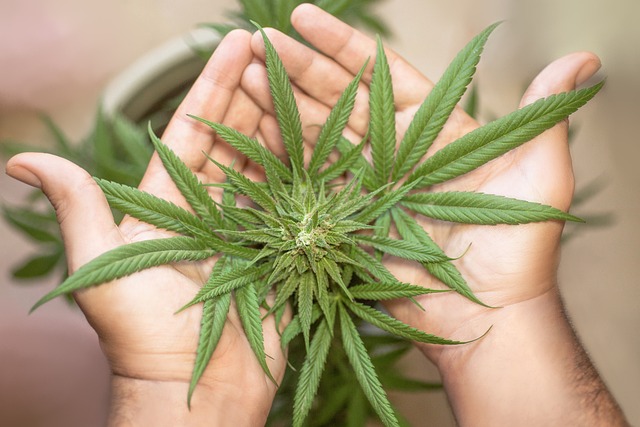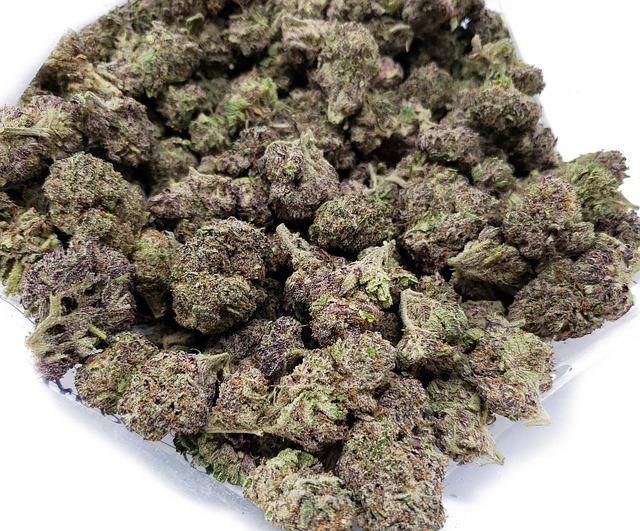THCA-rich hemp oil, a non-psychoactive extract from hemp plants, is gaining attention for its therapeutic properties, including anti-inflammatory, neuroprotective, analgesic, and potential antiemetic effects. Unlike its psychoactive counterpart THC, THCA engages with the endocannabinoid system to offer these benefits without altering one's mental state. The extraction process of THCA-rich hemp oil is meticulous, using methods like CO2 and ethanol extraction to preserve its efficacy. Post-extraction refinement ensures a high concentration and purity of THCA, aligning with both wellness needs and regulatory standards. Research into THCA's health benefits is ongoing, with promising indications for its role in managing pain, supporting cardiovascular health, alleviating anxiety, and potentially inhibiting cancer cell growth. Users are encouraged to consult healthcare professionals to safely explore the potential benefits of THCA-rich hemp oil as part of their wellness routine, ensuring they source products from reputable providers for guaranteed safety and efficacy.
Exploring the multifaceted nature of cannabinoids, this article sheds light on THCA-rich hemp oil, a non-psychoactive compound with a burgeoning reputation for its potential therapeutic and health benefits. As we delve into its composition, extraction methods, and the role it plays within the human body’s endocannabinoid system, readers will gain a comprehensive understanding of THCA’s significance in hemp products and its distinct advantages over THC. We’ll examine how THCA rich hemp oil can be integrated into a wellness routine, the legal considerations for its use across different jurisdictions, and the importance of quality and purity when selecting products. Safety and side effects are crucial aspects to consider, and this article will address these with a focus on user experiences and anecdotal evidence. As we navigate through the therapeutic properties, scientific research, and future directions for THCA rich hemp oil, our aim is to provide a balanced perspective on its benefits and potential impact on health and well-being.
- Understanding THCA Flower and Its Significance in Hemp Products
- THCA Rich Hemp Oil: Composition and Extraction Processes
- Potential Health Benefits of THCA Rich Hemp Oil
- The Role of THCA in the Body's Endocannabinoid System
- Exploring the Therapeutic Properties of THCA
- Safety Considerations and Side Effects of THCA Flower Consumption
Understanding Indacloud thca flower and Its Significance in Hemp Products

THCA-rich hemp oil has garnered attention for its potential health benefits, distinguished from other cannabinoids like THC and CBD. Tetrahydrocannabinolic acid A (THCA) is the raw, non-psychoactive precursor to delta-9-tetrahydrocannabinol (THC), the compound known for its psychoactive effects in cannabis. Found abundantly in raw cannabis plants, THCA is gaining recognition for its therapeutic properties, which include anti-inflammatory, neuroprotective, and potential antiemetic effects.
Research on THCA has suggested that it may interact with the body’s endocannabinoid system, influencing various physiological processes without the psychoactive side effects typically associated with THC. This makes THCA-rich hemp oil particularly significant in hemp products, as it can offer a broader range of benefits without the high. Users often consume THCA in its raw form or through decarboxylation, a process that converts THCA into THC if heat is applied. However, when left in its acidic form, THCA-rich hemp oil provides a spectrum of wellness benefits that are distinct from those of other cannabinoids, making it a valuable component in the expanding market of hemp-derived products.
THCA Rich Hemp Oil: Composition and Extraction Processes

THCA-rich hemp oil, a prominent derivative of the hemp plant, contains tetrahydrocannabinolic acid (THCA), which is the raw and non-psychoactive precursor to the well-known compound THC. This naturally occurring compound has garnered attention for its potential therapeutic benefits, including anti-inflammatory, neuroprotective, and analgesic properties. The composition of THCA rich hemp oil is rich in cannabinoids like THCA, CBD (cannabidiol), CBG (cannabigerol), and various other minor cannabinoids, terpenes, and flavonoids, all of which contribute to its holistic effects.
The extraction processes for obtaining THCA-rich hemp oil are sophisticated and require precise methodologies to maintain the integrity and potency of the compounds. The CO2 extraction method is one of the most preferred due to its efficiency in isolating THCA without degrading it into other cannabinoids. This process involves pressurizing carbon dioxide to behave as both a liquid and gas, which allows for selective extraction at specific temperatures. Another method is ethanol extraction, where ethanol is used as a solvent to extract the desired compounds from the hemp plant. The resulting THCA-rich hemp oil undergoes further refinement to ensure purity and concentration levels that align with consumer needs and regulatory standards. These extraction processes are critical in producing high-quality, beneficial THCA-rich hemp oil for therapeutic use.
Potential Health Benefits of THCA Rich Hemp Oil

THCA-rich hemp oil, derived from the raw cannabis plant, is gaining recognition for its potential health benefits due to the presence of tetrahydrocannabinolic acid (THCA), which is the precursor to THC. Unlike its psychoactive counterpart, THCA interacts with the body’s endocannabinoid system without inducing a high. This interaction may contribute to a variety of therapeutic effects. Preliminary research suggests that THCA may have anti-inflammatory and neuroprotective properties, which could be beneficial for conditions like arthritis and neurodegenerative diseases. Additionally, it is believed to possess antiemetic qualities, making it a potential aid for individuals undergoing chemotherapy who experience nausea and vomiting.
Furthermore, THCA-rich hemp oil benefits extend to its potential role in pain management. The cannabinoid may act as a natural analgesic by interacting with the CB2 receptors, which are involved in regulating pain and inflammation. This could offer an alternative or complementary treatment option for chronic pain conditions. Moreover, there is ongoing research into the efficacy of THCA in promoting cardiovascular health, reducing anxiety and stress, and even inhibiting the growth of certain cancer cells. The multifaceted potential of THCA-rich hemp oil benefits continues to be explored, with promising results that may pave the way for a broader range of therapeutic applications.
The Role of THCA in the Body's Endocannabinoid System

Delta-9-tetrahydrocannabinolic acid (THCA) is a non-psychoactive cannabinoid found in hemp and cannabis plants. It serves as the precursor to THC, the primary psychoactive component of cannabis. Within the human body’s endocannabinoid system (ECS), THCA interacts with the two main receptors, CB1 and CB2, offering a range of potential benefits. The ECS plays a crucial role in regulating various physiological processes, including mood, pain sensation, and immune response. THCA rich hemp oil, derived from high-THCA hemp cultivars, is being explored for its potential therapeutic properties. Preliminary studies suggest that THCA may offer anti-inflammatory, neuroprotective, and anti-nausea effects without the psychoactive ‘high’ associated with THC. This makes it an attractive option for individuals seeking the health benefits of cannabinoids without mind-altering side effects. The interaction of THCA with the ECS may modulate the system to help maintain homeostasis, which is the body’s natural state of balance and optimal health. Research continues to uncover the multifaceted role of THCA in supporting wellness, with ongoing clinical trials providing further insights into its efficacy and potential applications.
Exploring the Therapeutic Properties of THCA

Betacarbolin, a non-psychoactive cannabinoid found in hemp and cannabis plants, is the raw form of THC, known as tetrahydrocannabinolic acid A (THCA-A). As research continues to unfold, THCA is increasingly recognized for its potential therapeutic properties. This cannabinoid is believed to interact with the body’s endocannabinoid system, which regulates a range of functions and processes, including mood, appetite, and pain sensation. Studies suggest that THCA may offer anti-inflammatory, anti-nausea, anti-emetic (reducing nausea and vomiting), and neuroprotective effects without the psychoactive side effects associated with its decarboxylated form, THC.
THCA rich hemp oil benefits are gaining attention for those seeking natural health support. Unlike its psychoactive counterpart, THCA doesn’t induce a high but may provide relief from various conditions such as chronic pain and inflammation. It is also being explored for its potential in supporting the immune system, reducing anxiety, and aiding sleep due to its interaction with the body’s CB1 and CB2 receptors. Users interested in exploring the benefits of THCA rich hemp oil should consider the product’s purity, concentration, and extraction methods to ensure optimal therapeutic effects. As with any supplement, it is advisable to consult with a healthcare professional before incorporating THCA rich hemp oil into one’s wellness regimen.
Safety Considerations and Side Effects of THCA Flower Consumption

When exploring the potential benefits and side effects of THCA flower, a non-psychoactive compound found in cannabis and hemp plants, it is crucial to approach the subject with a focus on scientific evidence and consumer safety. THCA rich hemp oil has garnered attention for its therapeutic properties, which may include pain relief, anti-inflammatory effects, and potential benefits for neurodegenerative diseases. However, before integrating THCA into one’s wellness routine, understanding the safety considerations and possible side effects is essential.
Consumption of THCA flower can offer a wide array of potential health advantages without the psychoactive effects associated with its counterpart, THC. Users may experience benefits such as reduced anxiety, improved appetite, and anti-nausea properties. Nonetheless, it is important to note that while THCA is generally considered safe, side effects can occur, particularly at higher doses. These may include dizziness, lethargy, and altered senses. Additionally, individuals with pre-existing health conditions or those taking other medications should consult with a healthcare professional before using THCA products, as interactions can sometimes arise. Adverse reactions are rare but not unheard of, and responsible use requires a clear understanding of one’s body’s response to THCA rich hemp oil benefits. It is also pivotal to source THCA from reputable providers to ensure product safety and efficacy.
In conclusion, THCA-rich hemp oil has garnered significant attention for its potential health benefits and its role within the endocannabinoid system. As outlined in this article, understanding THCA’s composition and extraction processes is crucial for harnessing its therapeutic properties effectively. While exploring the myriad of advantages associated with THCA-rich hemp oil benefits, it’s important to approach consumption with caution, considering the safety aspects and potential side effects. Balancing the pursuit of wellness with responsible use ensures a comprehensive understanding of how this compound interacts within our bodies. Therefore, those interested in incorporating THCA-rich hemp oil into their wellness routine should do so informed by scientific research and guided by professional advice to maximize benefits while minimizing any adverse effects.
